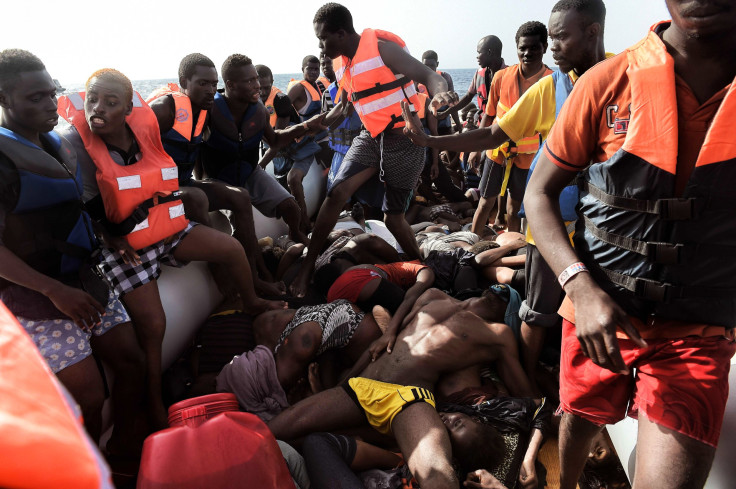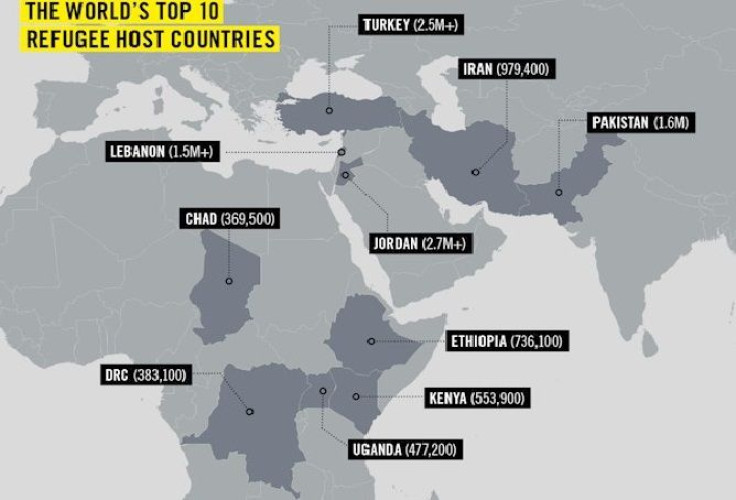Where Are Refugees Going? Map Shows Richest Nations Aren’t Taking Their Fair Share As Crisis Worsens

The world’s wealthiest countries have been accused of not coming close to pulling their weight and displaying a “complete absence of leadership and responsibility" in the ongoing refugee crisis. A new report from Amnesty International shows that just 10 countries, which account for just 2.5 percent of global GDP, host half of the world’s refugees.
There are currently 21.3 million refugees across the world, with 4.8 million of those created by the ongoing conflict in Syria. And the London-based human rights group has stated that the refusal of the countries with the most resources to tackle the problem has only exacerbated the crisis.
“The problem is not the global number of refugees, it is that many of the world’s wealthiest nations host the fewest and do the least,” Salil Shetty, Amnesty’s secretary-general, said to accompany the release of Tuesday’s report.
“If every one of the wealthiest countries in the world were to take in refugees in proportion to their size, wealth and unemployment rate, finding a home for more of the world’s refugees would be an eminently solvable challenge. All that is missing is cooperation and political will.”

Instead, it has been it has been the neighbors of those countries in crisis that have borne the greatest responsibility. Just 10 countries, all in the Middle East, Africa and South Asia have taken in 56 percent of the world’s refugees. Jordan is housing more than 2.7 million, while another of Syria’s neighbors, Turkey has taken in over 2.5 million. Bearing the brunt of those displaced by conflict in Afghanistan, Pakistan is home to 1.6 million refugees.
In an attempt to share the burden, Amnesty International has called for criteria based on population size, national wealth, and unemployment rate in order to assess a country’s refugee intake.
Along with Australia, the strongest condemnation is reserved for the European Union, which Amnesty International said has “actively sought to prevent asylum-seekers and refugees from accessing its territory.” Amid increasing rhetoric exclaiming the threat of taking increasing numbers of refugees, those fleeing war at home have been forced to take perilous routes in their search for asylum.
As of two weeks ago, more than 300,000 migrants and refugees had arrived in Europe by sea, according to the International Organization for Migration, most crossing the Mediterranean to Italy or the Aegean Sea to get to Greece. Last year, almost 4,000 were feared to have drowned. On Tuesday, the Italian coast guard said that it had rescued more than 6,000 refugees in a single day.
In the U.S., the issue of whether and how many Syrian refugees to accept has featured prominently in the presidential race. In Tuesday night’s vice-presidential debate, Donald Trump's running mate, Mike Pence, attacked Democratic nominee Hillary Clinton’s plan to increase the number of Syrian refugees being accepted from 10,000 this fiscal year to 65,000.
While Pence criticized the 550 percent increase, the figures from Amnesty International demonstrate how low that number remains in the overall context of the refugee crisis. Trump has called for a ban on all Syrian refugees entering the U.S., making unsubstantiated claims about the accompanying terrorism risks.
The Amnesty International report also reserved harsh judgment for U.S. policies on refugees arriving from closer to home. Both the U.S. and Mexico have put strong restrictions on refugees arriving from Central America, even if those were eased by President Barack Obama in July.
“The policies of the U.S. and Mexico are in theory designed to protect migrants, yet in practice serve as fast-track approaches to apprehend and deport foreigners entering both countries, without ensuring that those in need of asylum can claim it and obtain it,” the Amnesty International report read. “Both are falling short of their international obligations to those who present grounds for international protection.”
One wealthy nation is singled out for praise, however. Canada is cited as an example to follow after resettling 30,000 Syrian refugees since November 2015 with another 18,000 applications currently being processed.
© Copyright IBTimes 2024. All rights reserved.











